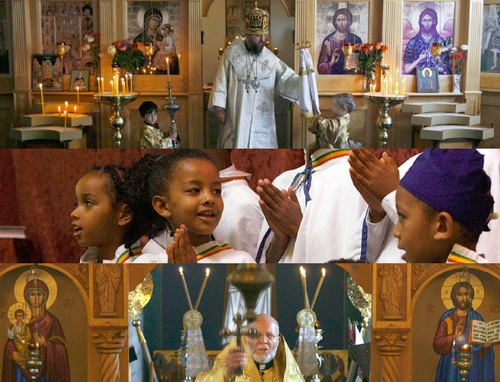This is an archived article that was published on sltrib.com in 2010, and information in the article may be outdated. It is provided only for personal research purposes and may not be reprinted.
If a group of Orthodox Christians meeting in Salt Lake City next week has its way, future generations of Greek, Serbian, Russian and other ethnic faithful all will worship together in a single American church.
Oh, and the services all will be in English.
A unified church would "honor and celebrate the multicultural Orthodox community here," says Bill Souvall, a longtime Salt Laker who is the current president of the Orthodox Christian Laity, coming to Utah for its 23rd annual meeting. "It would give us a powerful presence in America. Spiritual seekers and searchers would find us."
There currently are 14 Orthodox jurisdictions in America, four of them in the Salt Lake Valley alone — Greek, Antiochian, Serbian and Russian.
Each of these groups has its own bishop in the country of origin and its own language, but the liturgy and doctrines are the same, Souvall says. "The churches of America should be American. They shouldn't have all these separate archdioceses."
Even so, this push for unity is not universally accepted.
Some bishops who look to Europe for leadership are not eager to displease their superiors, Souvall says. Older members also worry about losing their language, culture, identity and ties to their home countries.
Such immigrants built their American parishes "with their nickels and dimes," says George Matsoukas, Orthodox Christian Laity's executive director in an interview from Palm Beach, Fla. They always have been "the force that guided the church."
But Orthodox Christians in the United States had a markedly different experience from their families and friends in other nations.
Orthodox Christianity began in Judea, then moved to the Mediterranean region, with centers in Rome, Constantinople, Antioch, Jerusalem and Alexandria, Egypt. Missionaries who left from those centers created churches in various Slavic countries, for example, but the newly created church then would be led by the home region until the new group was strong enough to stand on its own, or "autocephalous."
Each new group that came to this country looked to its home for ecclesiastical guidance. After the Russian Revolution in 1917, many Orthodox Christians fled to the United States through Alaska. But there was a split in the Russian Orthodox Church between those followers who left and those who stayed. By the 1970s, the Russian Orthodox Church allowed its American wing to go independent.
The patriarch of Moscow created a separate entity, which became the Orthodox Church in America. A large group of young Protestant Christians, many from Campus Crusade for Christ, joined the Antiochian Orthodox Church together.
Then, in the late 1980s, a group of members created the Orthodox Christian Laity and began pushing for greater involvement in church governance.
Clergy and lay members, Matsoukas says, "have to work in synergy to reach the best balance."
Together they began talking about unity.
After more than two decades of prompting and pushing, more than 60 bishops convened in 2009 an Episcopal Assembly of North and Central America. They discussed, Matsoukas says, the spiritual and legal issues confronting a move to unify the diverse groups.
Next week, those gathering in Salt Lake City hope to advance the conversation. They will consider what legal and structural obstacles to unity remain.
"Orthodox Christianity in America is at a crossroads," Matsoukas says. "Our bishops may be stuck in a groove, but the young people are asking for this. We all need to work together — clergy, hierarchy and laity — in love and fellowship for the good of the church and of the nation that we live in and are a part of."
They hope, he says, that "the Holy Spirit will move the bishops."
Orthodox churches in Salt Lake Valley include
Holy Trinity Greek Orthodox Cathedral, Salt Lake City
Prophet Elias Greek Orthodox Church, Holladay
Sts. Peter & Paul Antiochian Church, Salt Lake City
St. George Russian Orthodox Church, West Jordan —
About the meeting
P Orthodox Christian Laity, a national organization comprised of laypersons and clergy from various Orthodox jurisdictions, will stage a board of directors meeting in Salt Lake City along with a program featuring distinguished scholars Friday, Oct. 15, and Saturday, Oct. 16. The event schedule will be available in the lobbies at Holy Trinity Cathedral and Prophet Elias Church.



